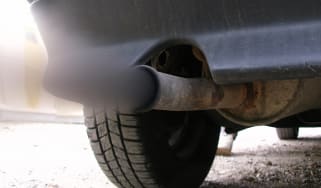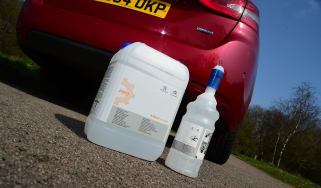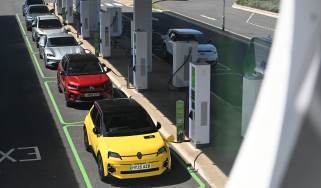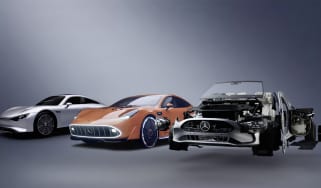What is the ZEV Mandate? The Zero Emissions Vehicle Mandate and how it affects you
The Government has recently revised its ZEV Mandate rules; we explain what that means and how it affects you
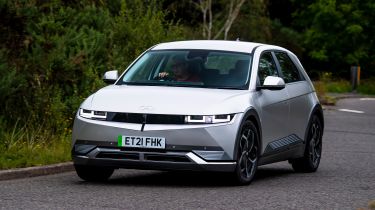
The Zero Emissions Vehicle Mandate (aka the ZEV Mandate) was billed as “the most ambitious regulatory framework for the switch to electric vehicles in the world” when it was announced all the way back in 2017.
As its name suggests, the goal behind the ZEV Mandate is to slowly electrify and decarbonise the UK’s roads by forcing manufacturers to build and sell greener vehicles. Since it came into effect in January 2024, car makers have been required by law to meet sales targets for zero-emissions vehicles, such as electric cars, to avoid receiving hefty fines.
The Mandate requires a rising percentage of individual manufacturers’ total annual sales to be zero-emissions vehicles each year. The figures were reached after a lengthy consultation with the car industry and environmentalists – we’ll go over the exact numbers in a moment – while targets for commercial vehicles are set lower, with only 10 per cent of new vans sold required to be electric this year, rising to 70 per cent by 2030.
At the time of writing, 2030 is the date for the start of the ban on sales of new petrol and diesel-engined cars in the UK, which is aligned with many other markets around the world.
However, following another consultation by the Government, hybrid-powered vehicles (as well as some petrol and diesel models from low-volume manufacturers) will be allowed to be sold between 2030 and 2035, although the majority of sales will still need to be taken up by ZEVs. There have also been other changes, which we’ll discuss below…
What is the ZEV Mandate quota?
In 2025, the Government requires manufacturers to ensure that at least 28 per cent of their new car sales are zero-emissions, up from 22 per cent in 2024. This will slowly increase up to a maximum of 80 per cent in 2030, but there are ways manufacturers can get round it, which we’ll come to.
| Year | Proportion of new car sales to be zero-emissions | Proportion of van sales to be zero-emissions |
| 2024 | 22% | 10% |
| 2025 | 28% | 16% |
| 2026 | 33% | 24% |
| 2027 | 38% | 34% |
| 2028 | 52% | 46% |
| 2029 | 66% | 58% |
| 2030 | 80% | 70% |
| 2035 | 100% | 100% |
What are ZEV Mandate credits?
Following the ZEV Mandate consultation, the Government made changes to the so-called “credits” system, which essentially allows manufacturers to borrow and trade sales figures in order to hit targets.
For example, a manufacturer with insufficient EV sales can trade credits with an EV-only brand in order to meet the Government’s quota. Brands planning a rapid electrification strategy can also borrow credits from future years, meaning they’ll be required to overachieve in the future, but are spared fines for now. Brands making vans as well as cars are also able to trade credits between their fleets, also potentially helping them dodge fines.
The credit system was due to come to an end in 2026, however, it has now been extended until 2029, although manufacturers are given less scope to borrow and trade as times goes on, with the percentage allowed decreasing year on year.
Are some brands exempt from the ZEV Mandate?
Until now, there has been a lot of concern that some brands, particularly high-performance ones like McLaren and Aston Martin, might be the heaviest affected by the Mandate, essentially having to abandon their entire line-ups in order to comply.
However, in news that will come as a relief to petrolheads across the country, the Government has announced that small-volume manufacturers (those with less than 2,500 registrations per year in the UK) will be able to dodge the majority of the Mandate’s rules; those registering over 1,000 per year simply have to keep to mutually agreed CO2 targets. On the other hand, ultra-small-volume brands that register less than 1,000 vehicles per year essentially have free reign to do what they want… for now.
Will the ZEV Mandate work?
The ZEV Mandate, while certainly ambitious, has had a huge impact on manufacturers; analysis from the UK’s Society of Motor Manufacturers and Traders suggests that car makers spent £4 billion in 2024 on customer incentives in order to try and dodge ZEV fines.
Even after the recent ZEV consultation and pumping ungodly amounts of money into discounts, the industry still lags behind what has been set by the Government. In fact, March 2025 marked the UK’s best month ever for new EV registrations, yet EVs still only accounted for 19.4 per cent of models sold so far this year, which is a far cry from the 28 per cent set by the Government.
Ultimately, manufacturers are calling for tangible Government incentives, such as a return of the Plug-in Vehicle Grant, in order to stimulate demand. A reduction in VAT for new EVs and for public charging could also help more people go electric, although the fact that EVs are now liable for VED road tax may turn some away.
Now you can buy a car through our network of top dealers around the UK. Search for the latest deals…


